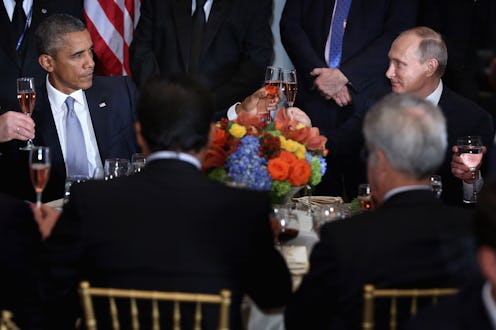News
Putin & Obama's Syria Plans Are Very Different
During a meeting of the United Nations General Assembly Monday, U.S. President Obama said that his outline to resolve the current conflict in Syria did not involve a "return to pre-civil war rule" implemented by Syrian President Bashar al-Assad. Although he specified that the United States would be willing to work with nations like Iran and Russia in order to achieve peace in the region, Obama's plan clashed with that of Russian President Vladimir Putin, who insisted that Syria's leader ought to be applauded for his efforts against ISIS militants, rather than condemned for his regime's documented human rights abuses. While both leaders remained civil throughout the day's events, the uncomfortable tension over their vastly different strategies was apparent.
"Nowhere is our commitment to international order more tested than in Syria," said Obama, speaking to the U.N. General Assembly. "When a dictator slaughters tens of thousands of his own people, that is not just a matter of one nation's internal affairs." He explained that while the United States was "prepared to work with any nation, including Russia and Iran, to resolve the conflict," it also recognized that there could not be "so much bloodshed, so much carnage, a return to the prewar status quo" that it cancelled out any progress made through global intervention.
In stark contrast to Obama's words, when he took to the U.N. podium later that day, Putin insisted that Assad's regime played a valuable role in the Syrian civil war. "[The world] should acknowledge [Assad's work]," he said. "We propose discussing whether it is possible to agree on a resolution aimed at coordinating the actions of all the forces that confront the Islamic State and other terrorist organizations."
Putin's plan, while diplomatic on paper, seemed to blatantly ignore the violence inflicted by the Assad regime, which the U.N. Security Council aggressively condemned in June this year. At the time, U.N. Secretary-General Ban Ki-moon, referencing the many documented chemical and barrel-bomb attacks perpetuated by Assad and his loyalists, said that Syrian civilians were experiencing "atrocities and human rights abuses" on a daily basis. Ban's former aide, Valerie Amos, called for the council to enact a strict arms embargo in order to counter the continued bloodshed.
The assembly was not the first time in recent history that Putin has backed the Assad regime. In early September, he announced that the Russian military had been providing the Syrian Army with "serious" training to battle the rebel forces. "To say we're ready to [provide ground troops in Syria is] premature ... but we are already giving Syria quite serious help with equipment and training soldiers, with our weapons," said the Russian president in a statement to the state-owned RIA Novosti news agency. "We really want to create some kind of an international coalition to fight terrorism and extremism."
As The Telegraph pointed out that same day, over the past four-and-a-half years, Russia has utilized its seat in the U.N. to support Assad's forces. It's vetoed any resolution that condemns the dictator's ironclad hold on the region, forcing the international community to sit back and watch as Assad and his regional allies continue to violently stamp out any dissent among the public.
In his speech Monday, Obama, who maintains an icy but civil relationship with Putin, made it clear that while toppling the Islamic State was a top priority, the world simply could not afford to allow Assad free, tyrannical reign over his people any longer. He urged the U.N. to find ways to enact peace within the Middle Eastern nation while simultaneously focusing its larger militaristic efforts on ISIS itself. Obama added:
I've said it before ... there is no room for an apocalyptic cult like ISIL, and the United States makes no apology for using our military as part of a broad coalition to go after them. We will not be outlasted by extremists. But while military power is necessary, it is not sufficient to resolve the situation in Syria. Lasting stability can only take hold when the people of Syria can forge an agreement to live together peacefully.
